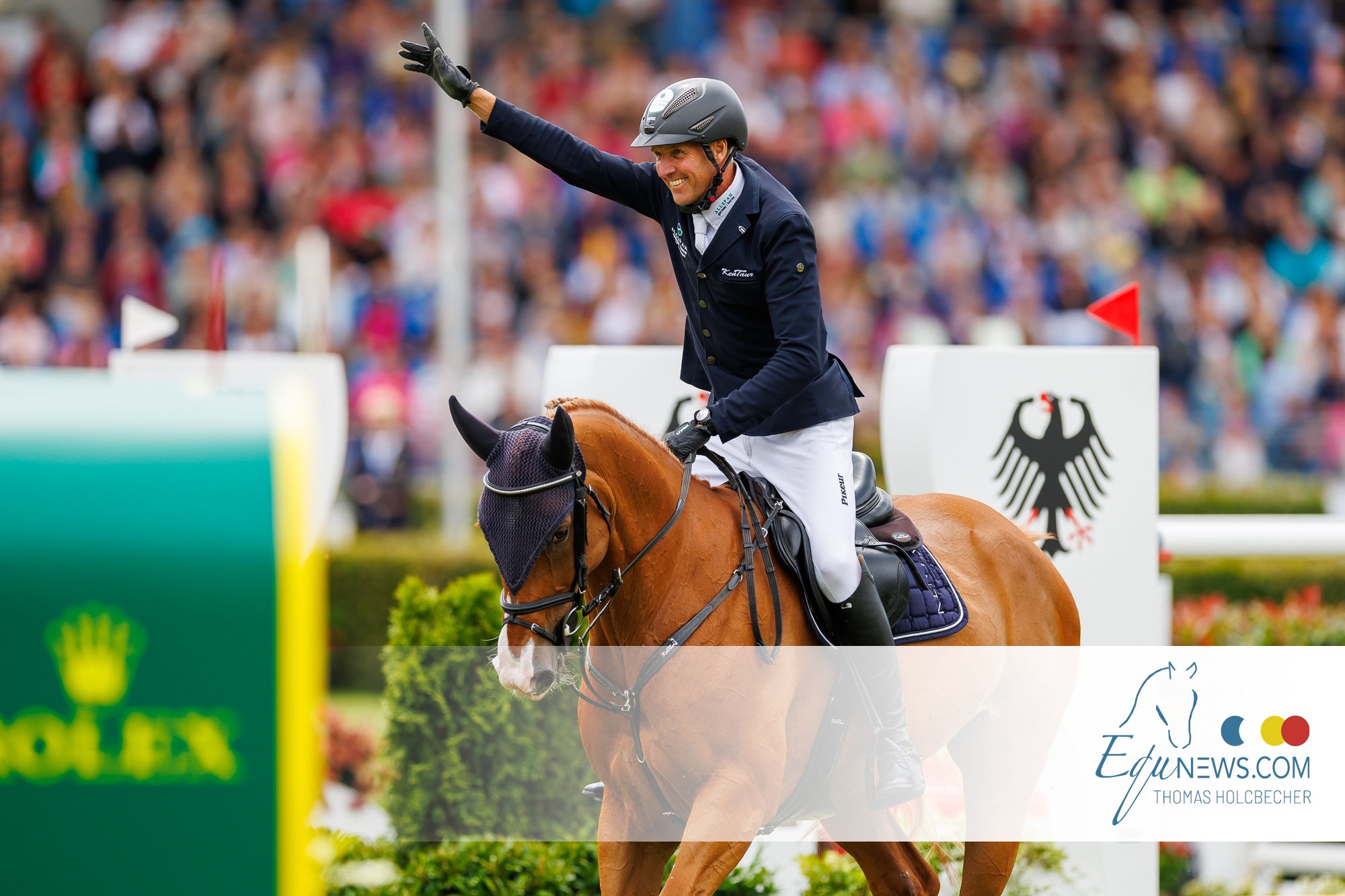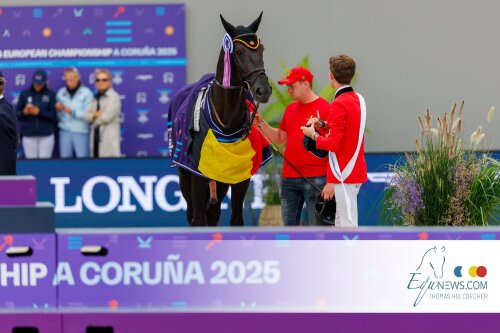In this interview, André Thieme looks back on his victory at the prestigious Rolex Grand Prix at CHIO Aachen, a dream come true. He shares his experiences about the road to this success, including the challenges he and his team faced, and the special bond with his horse DSP Chakaria. The conversation also covers the important role of trust between rider and horse, preparation for major competitions such as the CPKC 'International' Grand Prix, and the invaluable support of his team. Finally, he reflects on the impact of the Rolex Grand Slam on show jumping and his sporting inspiration.
Congratulations, you are the Rolex Grand Slam of Show Jumping live contender following your sensational win at the CHIO Aachen, how do you feel?
At the time I was hoping to be selected for Germany’s Olympic team, so I didn’t have much time to celebrate. But of course the win felt incredibly special, and I realized that I'd have to become an Olympic Champion to match that victory! Winning the Rolex Grand Prix at the CHIO Aachen was a perfect story for me - it was a lifelong dream come true.
Reflecting on your win in the Rolex Grand Prix at the CHIO Aachen – how special was this victory to you and your team?
It was very special. When I had two poles down in the Nations Cup class at the CHIO Aachen my whole team was so sad because we knew that would probably be the end of my Olympic hopes. However, when I won the Rolex Grand Prix on Sunday, that turned things around completely and we were all so happy and thrilled. The whole team kept saying: “this win is even better than going to the Olympics!”
Can you tell us more about DSP Chakaria – why is she so special and what is she like as a character?
In the stable, you would never expect DSP Chakaria to be such a superstar. She is the most calm, laid-back, and relaxed horse. She is a little shy with people, likes to be on her own, and will happily sleep all day in her stable – she is a very calm horse. However, as soon as you put a saddle on her and start cantering and jumping, she comes alive. It's like switching on a big machine! DSP Chakaria transforms from a calm, sweet horse into a firecracker.
When I ride her, she pumps herself up and has a lot of energy, which means she can be quite feisty at times. She has not always been the easiest to ride – sometimes it was hard to have a steady contact and have my leg on. Over the last five years, we have been working on keeping her calm and relaxed when jumping. She has so much power and explosion that is was sometimes hard to have a smooth looking round. We've made big progress with our flatwork in the last two years, and I have had unbelievable success with her – we have won the Rolex Grand Prix at the CSIO Roma Piazza Di Siena, the individual FEI European Championship title, and other big five-star Grands Prix around the world together.
It has always been great with Chakaria, but this year, things somehow became smoother. Winning the Rolex Grand Prix at the CHIO Aachen is something a rider will never forget – it is like winning an individual championship medal. I know what it means, and I know that every show jumper in the world wants that title. Chakaria made it all happen; she is such a special horse.
I think the reason that she is so special is because she is the full package. I have had scopey and careful horses before, but Chakaria is scopey, careful, fast, flexible, powerful, and one of her biggest strengths that makes her a true championship horse is her stamina. Even after five days of competition, she is still sharp and fresh—the more she jumps, the better she gets. At the CHIO Aachen, the Rolex Grand Prix was the fourth, fifth and sixth rounds that she jumped – she is better the more she jumps. Chakaria is complete in every way, she doesn’t really have a weakness and is truly extraordinary.
How important is the relationship and the bond between a horse and rider to win a Rolex Grand Slam of Show Jumping Major?
I strongly believe, and have always said it, that riders can only achieve great things in show jumping if they have a very good relationship with their horse – it is all about trust. Your horse needs to want to fight for you. I love DSP Chakaria, and of course the big victories influence that, but from the beginning with her, there was something special. I had to be careful with her when she was younger not to go too quickly as she was a bit difficult at the start of our partnership and we had to grow together, which I think makes a difference. I am pretty sure that she also likes me!
The CPKC ‘International’ Grand Prix, presented by Rolex is often considered to be one of the toughest courses in the world. How have you been preparing yourself and your horse for this?
I am going to take DSP Chakaria with me, but I am not sure if I will ride her in the CPKC ‘International’ Grand Prix, presented by Rolex . I have competed at the CSIO Spruce Meadows ‘Masters’ Tournament many times, and I know that some of the top championship horses do not always jump their best there, because the traditional style of jumps with the long rails and courses don’t suit all horses. Spruce Meadows is special, but even some great horses like King Edward [ridden by Henrick Von Eckerman] don’t tend to jump as well in the arena there. Therefore, I am not sure which horse I will ride in the Grand Prix. Although, since she is so brave and forward, and likes jumping on grass, I think she will be fine – I am definitely going there with big hopes.
Who has been the biggest inspiration in your career and why?
As a young boy, I was always looking up to people like Ludger Beerbaum, and now I am riding with the likes of Christian Ahlmann, Marcus Ehning, Daniel Deusser, and Steve Guerdat, I try to continue learning from them as well. I try to do my job with open eyes and learn something from every great rider, of whom there are many. However at the same time, I believe it is important for riders to focus on their own strengths and ride with their own strategy too. I can’t really pick out one singular rider who has been my biggest inspiration, but I have been and am still inspired by many different riders. The main thing is that I still try to keep learning and developing.
How important is your wider team, for example, grooms, vets, etc. in your success?
It starts with my family at home. They go through a lot with me competing so much and fighting for spots on big championship teams. Going to championships brings a new kind of pressure, and the mental effect is different from the norm. My family supports me while I am in that zone and perhaps acting differently or more stressed than usual. They have my back and give me my freedom – they are my main anchor.
Then, of course, the grooms, the home riders, the managers, and all the people around me are so important. They plan everything and make it possible for me to go to the shows, and enable me to be able to only focus on my horses, and worry about what is happening at home. Our sport requires a big team effort, and I think that when we have a big win, we will all win together. The horses are crucial too; without a good horse, you can’t achieve the big wins.
I have never really had a trainer, apart from my dad when I was younger, so when I win something like the Rolex Grand Prix at the CHIO Aachen, it really was for myself and my whole team.
How big an impact do you think the Rolex Grand Slam of Show Jumping has had on the sport, and how important do you think sporting Majors, such as the CHIO Aachen or The Championships, Wimbledon are in sport?
I think it is very hard to win the Rolex Grand Slam of Show Jumping; it has only been achieved by Scott Brash in 2015. These days, it is even more challenging because there are so many different riders and horses who could win a Major. I’m not sure if anyone will ever win it again. However, the chance to try and win the Rolex Grand Slam of Show Jumping makes a big difference to the sport. It's not only the big prize money on offer, but the title of winning the Rolex Grand Slam of Show Jumping, or winning a Major, is something pretty special - almost like winning a gold medal at the Olympic Games! It is quite similar to the Grand Slams in tennis; everybody wants to win them, but most never get close – only the great athletes do, and they become part of the sport’s history. To win a Major you have to be the best of the best – it does not happen by luck.
If you weren’t a show jumper, what would you have been?
I was a very good soccer player when I was younger, so I once dreamed about being a professional player. However, now I am older, I think that dream has finished! I’m not sure what I would have been if I was not a show jumper, but it would have been something related to sports. I am a sport lover – aside from soccer, I watch and play tennis. My son is a handball player, and so I have become quite interested in that. I now spend a lot of time in the United States of America, and so I watch a lot of NBA and basketball.



